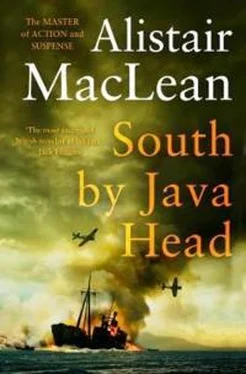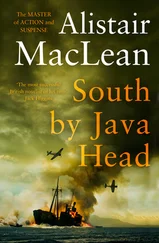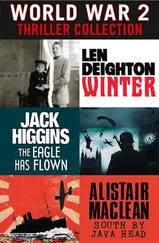The road to Bantuk – no road, really, but a graded jungle path barely six feet wide – wound tortuously in and out among palm-oil plantations, tobacco plantations and evil-smelling swamps, waist deep and infinitely treacherous in the darkness. But the way Telak led them that night skirted the road only once, crossed it twice, penetrated straight through swamps and paddy fields and plantations, arrow-straight for the heart of Bantuk. All three men were hurt, and badly: all of them had lost blood, Telak most of all, and no competent doctor would have hesitated to immobilise any of the three in hospital; but they ran all the way to Bantuk, across impossible, energy-sapping, heart-breaking terrain, never once breaking down into a walk. They ran with their hearts pounding madly under the inhuman strain, leaden legs fiery with the pain of muscles taxed far beyond endurance, chests rising and falling, rising and falling as starving lungs gasped for more and still more air, the sweat running off their bodies in streams. They ran and they kept on running, Telak because this was his element and his father lay dead in the village with a Japanese bayonet through his chest, McKinnon because he was still mad with rage and his heart would keep him going until he dropped, Nicolson because he was a man beside himself and all the pain and labour and suffering was happening to someone else.
The second time they crossed the road they saw the Japanese truck, not five yards away in the darkness. They didn’t even break stride, there could be no doubt that it was abandoned, that the Japanese had taken their prisoners with them and hurried on on foot towards the town. And the truck had managed to travel much farther than they had expected before it had broken down, at least half-way towards Bantuk, and they had no means of knowing how long ago the Japanese had left it. Nicolson was coldly aware that their chances now were all the poorer, very slender indeed. All of them knew it, but not one of them expressed the thought, suggested that they might ease their killing pace, even if only a fraction. If anything they lengthened their strides and pounded on even more desperately through the darkness.
More than once, after the sight of that truck, pictures flashed into Nicolson’s mind of how the Japanese soldiers must be treating their prisoners as they hurried them on fearfully along the jungle path. He had visions of rifle butts, maybe even bayonets, prodding viciously into the sick old captain, stumbling in sheer weakness and weariness, and into Gudrun as she, too, stumbled along in the darkness, cruelly handicapped by the crippling weight of the little boy in her arms – even after half a mile, a two-year old can become an intolerable weight.
Or maybe she had dropped young Peter, maybe they had abandoned the little boy in their haste, left him by the side of the jungle, left him surely to die. But the mentor watching over Nicolson’s mind that night never let these thoughts stay with him long. They stayed long enough only to spur him on to even greater efforts, never long enough for obsession and ultimate weakness. Throughout all that interminable lurching, gasping run in the darkness, Nicolson’s mind remained strangely cold and remote.
It had turned cold, the stars had gone and it was beginning to rain when at last they reached the outskirts of Bantuk. Bantuk was a typical Javanese coastal town, not too big, not too little, a curious intermingling of the old and the new, a blend of Indonesia of a hundred years ago and of Holland ten thousand miles away. On the shore, following the curve of the bay, were the crazy, ramshackle huts erected on long bamboo poles below the highwater mark, with their suspended nets to trap the tidal catch of fish, and half-way along the beach a curved breakwater hooked far out into the bay, sheltering launches and fishing vessels, the tented prahus and the double outrigger canoes too large to be dragged up past the fishing-huts. Paralleling the beach, behind the huts, stretched two or three straggling, haphazard rows of straw-roofed wooden huts as found in the villages in the interior, and behind that again was the shopping and business centre of the community, which led in turn to the houses that stretched back into the gentle valley behind. A typical Dutch suburb, this last, not perhaps with the wide, lined boulevards of Batavia or Medan, but with trim little bungalows and the odd colonial mansion, every one of them with its beautifully kept garden.
It was towards this last section of the town that Telak now led his two companions. They raced through the darkened streets in the middle of the town, making no attempt at concealment, for the time for concealment was past. Few people saw them, for there were few abroad in the rain-washed streets. At first Nicolson thought that the Japanese must have declared a curfew, but soon saw that this was not the case, for a few coffee shops here and there were still open, their smocked Chinese proprietors standing under the awnings at the doorways, watching their passing in an impassive silence.
Half a mile inland from the bay, Telak slowed down to a walk and gestured Nicolson and McKinnon into the sheltered gloom of a high hedge. Ahead of them, not more than fifty yards away, the metalled road they were now standing on ended in a cul-de-sac. The bounding wall was high, arched in the middle, and the archway beneath was illuminated by a pair of electric lanterns. Below the archway itself two men were standing, talking and smoking, each leaning a shoulder against the curving walls. Even at that distance there was no mistaking the grey-green uniforms and hooked caps of the Japanese army, for the light was strong. Behind the archway they could see a drive-way stretching back up the hill, illuminated by lamps every few yards. And beyond that again was a high, white-walled mansion. Little of it was visible through the archway, just a pillared stoop and a couple of big bay windows to one side, both of them brightly lit. Nicolson turned to the gasping man by his side.
“This is it, Telak?” They were the first, words spoken since they had left the kampong .
“This is the house.” Telak’s words, like Nicolson’s, came in short, jerky gasps. “The biggest in Bantuk.”
“Naturally.” Nicolson paused to wipe the sweat off his face and chest and arms. Very particularly he dried the palms of his hands. “This is the way they would come?”
“No other way. They are sure to come up this road. Unless they have already come.”
“Unless they have already come,” Nicolson echoed. For the first time the fear and anxiety swept through his mind like a wave, a fear that would have panicked his mind and an anxiety that would have wrecked his plans but he thrust them ruthlessly aside. “If they’ve come, it’s already too late. If not, we still have time in hand. We may as well get our breath back for a minute or two – we can’t go into this more dead than alive. How do you feel, Bo’sun? ”
“My hands are itching, sir,” McKinnon said softly. “Let’s go in now.”
“We won’t be long,” Nicolson promised. He turned to Telak. “Do I see spikes above the walls?”
“You do.” Telak’s voice was grim. “The spikes are nothing. But they’re electrified all the way.”
“So this is the only way in?” Nicolson asked softly.
“And the only way out.”
“I see. I see indeed.”
No words were spoken for the next two minutes, there was only the sound of their breathing becoming shallower and more even, the intervals between breaths lengthening all the time. Nicolson waited with an almost inhuman patience, carefully gauging the moment when recovery would be at its maximum but the inevitable reaction not yet set in. Finally he stirred and straightened, rubbing his palms up and down the charred remnants of his khaki drills to remove the last drop of excess moisture, and turned again to Telak.
Читать дальше
Конец ознакомительного отрывка
Купить книгу










